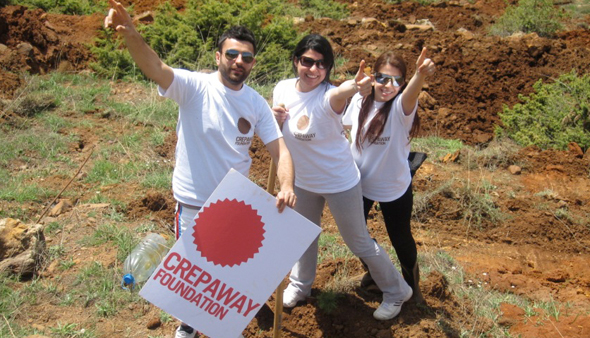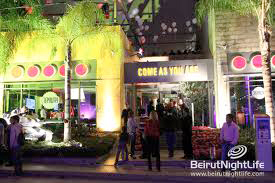Crepes with a Side of Corporate Responsibility
The concept of corporate social responsibility has been gaining traction in the Lebanese economy – with an increasing number of companies embracing the idea that they can profit from doing good while doing business.

Crepes with a side of corporate responsibility
By T.K. Maloy
JOUNIEH, Lebanon – The concept of corporate social responsibility has been gaining traction in the Lebanese economy – with an increasing number of companies embracing the idea that they can profit from doing good while doing business.
One such company is the Crepaway eatery.
Crepaway is familiar to Lebanese patrons as a family friendly diner, with retro decor and polite young waiters.
Crepaway is familiar to Lebanese patrons as a family friendly diner, with retro decor and polite young waiters.
But alongside business operations, the company works modestly through its foundation at community involvement and practicing a creed of corporate social responsibility.
“We don’t find it necessarily unrealistic to promote a brand while also communicating with our large audience on core social and environmental issues that threaten all of us,” said Crepaway General Manger Claude Thoumy, “Companies evolve in a community.”
Claude along with his brother Charles founded Crepaway in 1984 as a small kiosk.
In 2005, the company launched the Crepaway Foundation, an independent, non-profit philanthropic institution. The foundation contributes to the development of projects and organizations in fields that include health and human service programs, education, civic activities, cultural and artistic initiatives and environmental efforts, according to the company.
According to Professor Dima Jimali, Olayan School of Business, American University Beirut, “Corporate Social Responsibility is gaining momentum and traction in the Lebanese context. This is a trend that is likely to grow and become more mainstream both in Lebanon and the region over time. CSR is a critical contributor to sustainable development, helping create jobs, support SMEs and social entrepreneurship, and address the most thorny social challenges.”
Crepaway not only picks several NGOs and community causes a year to assist with funds but also leverages its activities with volunteer work from its staff, including, and up to, its 1,000 employees, said Albert Thoumay, foundation head.
He added that company staff likes to volunteer from the kitchen staff up to and including senior staff and members of the board. “Everyone takes great pride in their community involvement.
According to the foundation head, at both the company headquarters and its individual eateries, there is a “core” of staff that is particularly in touch with their local community causes, and often put in a pitch for funding or volunteering for these causes.
Thoumy said around 35 percent of the Crepaway Foundation budget “is dedicated to green activities and reforestation while most of the remaining 65 percent are dedicated to social issues. For example, we support the Red Cross, Sesobel, Lebanese Autism Society, Toufoula and the Alzheimer Association among others.”
The Foundation operates on funding from the company and board members and seeks no outside contributions.
The scene at the Crepaway headquarters in Jounieh is a working display of their various CSR efforts including cardboard boxes in the hallways for depositing bottles and paper which are picked up by Zero Waste Coalition, a group of more than 80 NGOs.
“The company (Crepaway) recycles plastic, paper and aluminum. We also offer our used frying oil to the construction industry that uses it as a lubricant for cement molds.” Thoumy said, “This saves tons of oil being dumped in the city sewers. And in regards to energy efficiency, we have also started replacing all our traditional light bulbs with LED lights, which reduces heat propagation and saves energy consumption.”
In 2012, a team from Crepaway participated in the planting of 300 cedar trees in the Barouk area with the Green Party and the AFDC (Association for Forests, Development & Conservation), which oversees caring for the small trees over a period of three years.
“During the recent Christmas period, we offered our guests 2,500 good-luck plants in organic kits,” said Thoumy
On the business side, the company operates 14 eateries in Lebanon, and has expanded into the MENA region with franchises in the KSA, Qatar and Jordan.
Claude Thoumy noted in an interview with Executive magazine that in a country that has the political and economic ups and downs that are characteristic of Lebanon, a company needs not only a strategic plan A and B, but also a plan “C and D, sometimes.”
“Sometimes you go for a five or six year plan, and something happens, like a war or a crisis,” he told Executive.